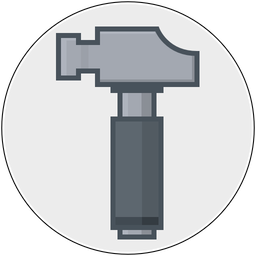Retrobatch is the name of my new MacOS app, and it's in public beta right now.
Retrobatch is a node based (not the JS language) batch image processor. A bit like Quartz Composer, and a bit like Audio Hijack. But for images. Lots and lots of images (or maybe a few or even one).
For years, people have wanted me to add batch processing of some kind to Acorn. It's been possible to automate things with JavaScript or AppleScript or Automator in Acorn, but it's never been super easy to set up and you needed to know a bit of programming to get anything really useful done. So I always had ideas in the back of my head for what it would look like.
But to do it right, it would need to be a new app. And then sometime late last summer, I decided it was time and I started working on Retrobatch.
But why node based? Every batch image processor I've come across was linear. You put images in one end, and out they came the other side. But that's so limiting! What if it was possible to take a folder of images and then operate on them twice with the same workflow? What if you could create branches where one would resize images to 50%, and another write out PNG files with the @2x suffix added to the file name? What if you had a workflow that referenced multiple folders which combined into a single output?
And all the possibilities! What if you could read an image from the clipboard, apply a filter to it, and write it to a folder and to the clipboard? What if you had a way to separate out PNG images of a certain size from a folder and only do an operation to those? What if you could script the application in response to new images being added to a shared folder? What about if it could capture all the open windows of your favorite application as images, then apply a filter to those, and then write out a layered PSD of those windows? What if you wanted to apply a machine learning model against your images, to figure out which contains pictures of hotdogs in them, and then perform some action based on that?
There's like, a trillion possibilities. Probably more. Beta testers have been surprising me with interesting workflows.
Anyway, you can do all that with the Retrobatch beta today with a free trial.
When it finally hits 1.0, fingers crossed, there will be two versions of Retrobatch- Regular and Pro. Pro will have all the nodes you see today, including advanced features such as machine learning, changing bit depths and color profiles, processing with AppleScript and shell scripts, rules, and advanced metadata entry. The Regular version will allow you to do the basics like cropping, resizing, watermarks, and so on. And there will be two prices as well. But right now, while it's in beta, you can purchase Retrobatch Pro at a reduced price.
Charging for a beta app? Yep- Retrobatch is very useful in its current state and people have been wanting to give me money already. So who am I to argue? In addition to that, bundles are back at the Flying Meat webstore. If you purchase multiple copies of Retrobatch, or a copy of Retrobatch and Acorn, or any of the above, you'll get a nice discount.
So go grab a beta copy of Retrobatch and send us feedback to help shape what it looks like in the future, or chat about it in the new Retrobatch forums.
And finally, here's a quick video showing off a workflow for making @1x and @2x images with Retrobatch.
